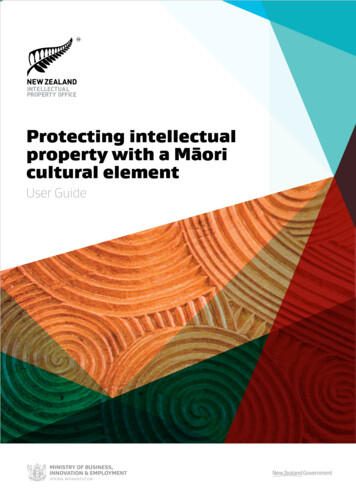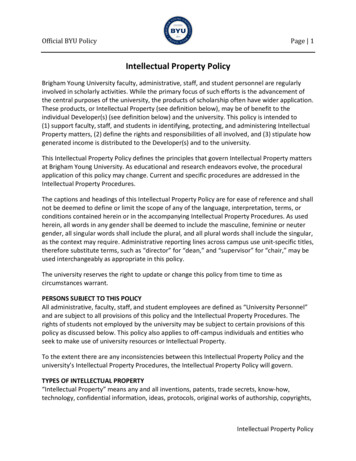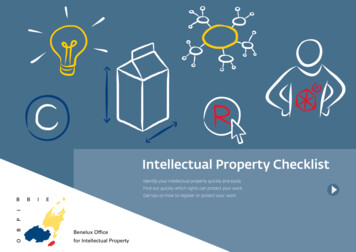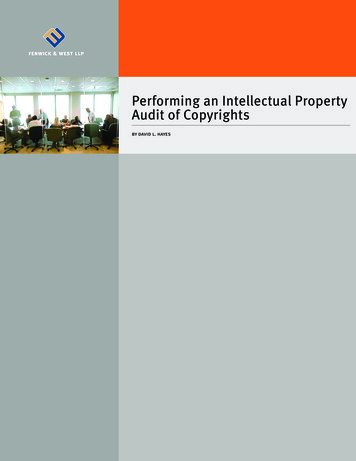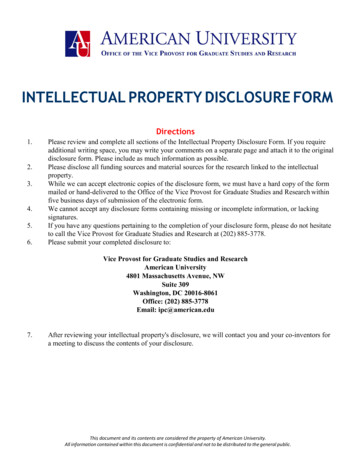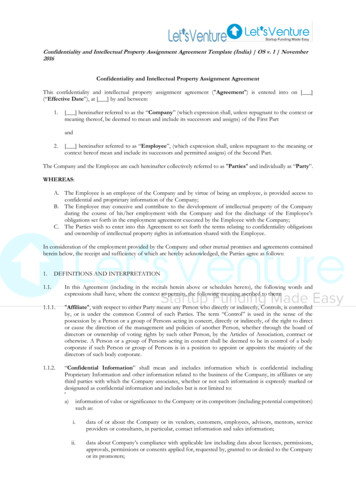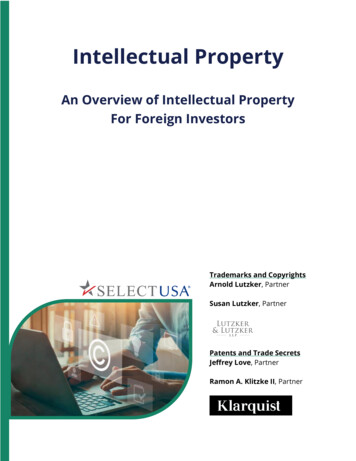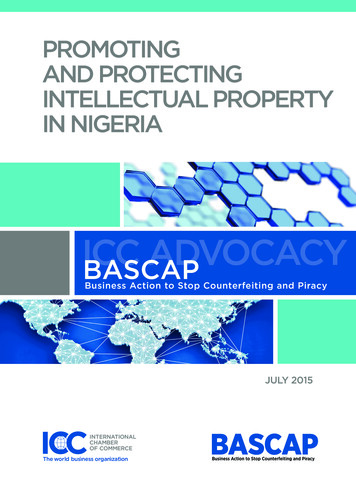
Transcription
PROMOTINGAND PROTECTINGINTELLECTUAL PROPERTYIN NIGERIAICCADVOCACYBASCAPBusiness Action to Stop Counterfeiting and PiracyJULY 2015
About the International Chamber of Commerce (ICC)ICC works to promote a balanced and sustainable system for the protection ofintellectual property. ICC believes that IP protection encourages innovation andthe development of knowledge-based industries, stimulates international trade,and creates a favourable climate for foreign direct investment and technologytransfer.About BASCAPCounterfeiting and piracy have become a global epidemic, leading to a significantdrain on businesses and the global economy, jeopardizing investments increativity and innovation, undermining recognized brands and creating consumerhealth and safety risks. In response, ICC launched BASCAP to connect andmobilize businesses across industries, sectors and national borders in the fightagainst counterfeiting and piracy; to amplify the voice and views of businessto governments, public and media; and to increase both awareness andunderstanding of counterfeiting and piracy activities and the associated economicand social harm. Visit BASCAP on the web at: www.iccwbo.org/bascapThis Report has benefited from contributions, support and endorsements by avariety of trade and anti-counterfeiting groups. BASCAP would like to thank:About ICC NigeriaNigeria became a member of ICC over 30 years ago, when it realized thebenefits that the business community could derive from mainstreaming intothe international global market. Following its reorganization in 1999, ICC Nigeria(ICCN) has sustained its growth pattern and relevance in this world body.Members of ICC Nigeria enjoy cross-border links with other influential seniorexecutives from the world’s top companies that aim to strengthen their ties andpartnerships with the country.About SONThe Standards Organisation of Nigeria also referred to as the ‘SON’ wasestablished by an enabling act No. 56 of 1971.The aims and objectives of the SON include preparation of standards relatingto products, measurements, materials and processes among others and theirpromotion at the international, national and regional levels, certification ofindustrial products, assistance in the production of quality products, improvementof measurement accuracies and circulation of information relating to standardsand ensuring in every way that consumers get value for their money.About IPLANSet up in 1995, the Intellectual Property Law Association of Nigeria (IPLAN) wasbirthed to aid capacity building in intellectual property and has been at the foreof the lobby for reforms in the law, administration, enforcement and adjudicationof intellectual property. It is a local association comprising right holders andpractitioners whose membership account for over 50% of the trade marks noncontentious work and 30% of contentious work in Nigeria.About AIPGHolding its inaugural summit in March 2013, the African Intellectual PropertyGroup (APIG) is a voluntary Africa-wide association of national IP institutions,governmental agencies, regional IP bodies, industry associations, IP practitioners,and individual IP stakeholders, or who otherwise have interest in IP developmentin the continent. AIPG believes that the utilization of IP is integral to Africa’seconomic growth, and seeks practical solutions to the challenges of utilizing andprotecting IP in Africa.About NAFDACThe mission of NAFDAC is to safeguard public health by ensuring that only theright quality food, drugs and other regulated drug products are manufactured,imported, exported, distributed, advertised, sold and used in Nigeria.NAFDAC supports organizations that employ legitimate and lawful steps inthe eradication of counterfeit medicines, unwholsome food, unsafe cosmetics,medical devices, chemicals and packaged water. The Agency acknowledgesand commends BASCAP’s effort in the fight against counterfeiting of NAFDACregulated products globally.
Table of ContentsList of Abbreviations. 2Executive Summary. 31. Intellectual property is important to Nigeria’s economic growth and development. 6IP benefits the economy.6IP attracts FDI.7IP promotes innovation.8IP promotes R&D and technology transfer.8IP helps firms monetize their inventions and grow.9IP protection helps small and medium enterprises. 10IP benefits consumers and society. 102. Risks associated with counterfeiting and piracy in Nigeria.12The Situation in Africa.12The Situation in Nigeria. 14Challenges in Nigeria. 143. Time is right for Nigeria to further improve its IP regime.184. Recommendations for a path forward.20Introduction.20Overview.20Legislative Recommendations.21Policy Recommendations. 24Conclusion. 29Notes.30Promoting and Protecting Intellectual Property in Nigeria1
List of Abbreviations2ACCAnti-Counterfeiting CollaborationBASCAPBusiness Action to Stop Counterfeiting and PiracyBSABusiness Software AllianceCLAMPCopyright Litigation and Mediation ProgramEUEuropean UnionFDIForeign Direct InvestmentICCInternational Chamber of CommerceIPIntellectual PropertyIPLANIntellectual Property Law Association of NigeriaIPONigerian Intellectual Property OfficeIPRIntellectual Property RightsIPTTOIntellectual Property and Technology Transfer OfficesNAFDACNational Agency for Food and Drug Administration and ControlNNaira - Currency of NigeriaNCSNigerian Customs ServiceNIPCOMNigerian Intellectual Property CommissionNOTAPNational Office for Technology Acquisition and PromotionNTANigerian Television AuthorityNTMANigerian Textile Manufacturers AssociationOECDOrganisation for Economic Co-operation and DevelopmentR&DResearch and DevelopmentSMEsSmall and Medium Sized EnterprisesSONStandards Organisation of NigeriaSTRAPStrategic Action Plan Against PiracyNCCNigerian Copyright CommissionTRIPSAgreement on Trade-Related Aspects of Intellectual Property RightsUNODCUnited Nations Office on Drugs and CrimeWCOWorld Customs OrganizationWIPOWorld Intellectual Property OrganizationPromoting and Protecting Intellectual Property in Nigeria
Executive SummaryEconomic growth is closely related to how well the economy encourages, stimulates andfosters creativity and innovation. A critical factor in maximizing the value of this creativityand innovation is a clear legal and regulatory system that recognizes the importance of theunderlying intellectual property (IP) and establishes and protects the property rights of thecreators, inventors and innovators.Developing countries such as Nigeria can benefit from a robust IP enforcement regimein the same way as more industrialized countries. But to do so, government leadersmust establish an appropriate legal and institutional framework; create awareness on theimportance of IPR; and protect industries reliant on patents to produce products that canimprove the quality of life in Nigeria, including pharmaceuticals, biotechnological inventions,business methods and software.Several challenges hamper the development of strong IP regimes in Nigeria and throughoutAfrica. One is that the cross-cutting nature of IP is not sufficiently acknowledged. Anotheris that in general, IP is not accorded a prominent place in national and political economicagendas. Institutions also lack connections with relevant groups such as universities,employers’ associations, chambers of commerce and industry, and others. Moreoverfinancial and material resources available for IP institutions are inadequate.Nigeria is making progress in increasing awareness and development of the IP system,encouraging innovative and inventive skills, and commercializing indigenous researchand development. The Nigerian economy can further benefit by focusing on its areas ofeconomic advantage, protecting appellations of origin and geographic indications, andusing strategies to distinguish local products from the region.At the same time, Nigeria has increasingly become both a target destination and significanttransit route for counterfeit and pirated products. Cheap, sub-standard fakes are floodingthe market through foreign and local traders while manufacturers are illegally replicatingwell-known brand names and designs on their packages and labels.Several factors have contributed to the wide-scale proliferation of counterfeit andpirated products throughout Africa. Such factors include the disproportionate size of itsinformal economy; corruption, particularly at entry points; out-dated legislation; and weakenforcement mechanisms, including a lack of national policy on combating counterfeitingand piracy. The infiltration of counterfeit medicines in African countries is of particularconcern, where up to 30% of medications on the market are counterfeit. Moreover, Nigerianconsumers are unaware of the risks involved in purchasing and consuming counterfeits.Much work remains in Nigeria to both strengthen the value and protection of IP rightsand to guard against counterfeiting and piracy. The purpose of this BASCAP report is tosuggest an initial set of policy and legislative recommendations that can work towardreducing counterfeiting and increasing the economic benefits associated with a strongsystem of IP rights—including the positive link between strengthening IPRs and economicdevelopment, increased rates of innovation, attracting foreign direct investment (FDI) andpromoting R&D and technology transfer.Combating counterfeiting and piracy must become a public policy priority in Nigeria. Thiseffort must start with the government’s clear message to the criminal networks and othersinvolved in counterfeiting and piracy that these activities will no longer be tolerated. Theseactions will help convince legitimate business owners and consumers that the governmentis serious about protecting IP rights. This initiative will also rally public support for theseefforts.Promoting and Protecting Intellectual Property in Nigeria3
The value of IPChapter 1 explains the value of IP and why a robust IP enforcement regime is important forNigeria’s integration into the global market. IP protection benefits the Nigerian economy in terms of GDP, employment, taxrevenue, development and competitiveness. For example, the copyright-related filmindustry—Nollywood—alone generates N600 million and is the country’s secondlargest employer.1 The strength of a country’s IPR regime strongly influences FDI. Although FDI inNigeria is increasing as on-going economic reforms improve investor perceptions,robust IPR legislation and strong enforcement are essential for Nigeria to realize itsfull FDI potential. IP protection promotes innovation, increases funding for R&D and helps firmsrealize more value from innovations. For a transition country such as Nigeria, realeconomic growth will depend on its ability to create an environment that stimulatesinnovation. A strong IPR regime will support innovative business and increasedemand for innovation throughout the economy. SMEs that use IP report faster growth and higher income than those that do not.Nigeria can potentially empower its SME sector to drive growth, wealth creation,poverty reduction and employment generation. Helping SMEs establish and protecttheir IP rights are important elements of support that the Nigerian government canprovide to its SME sector. IP protection benefits consumers and society, providing innovative productsand services in virtually every area of life—from clean energy to health care—and helping protect consumers from inferior and dangerous counterfeits. Theengagement of some organisations in Nigeria like the NOTAP and SON arefostering local innovations in a wide range of sectors as evidenced in the increasednumber of local Nigerian patents from 100 per year in 2006 to 400 registrationsper year in 2014.What’s at risk?Chapter 2 explores the problem of counterfeiting and piracy in Africa, focusing on keysectors in Nigeria.The report shows that several factors contribute to the wide-scale proliferation ofcounterfeit and pirated products throughout Africa including the disproportionate size ofits informal economy; corruption; out-dated legislation; weak enforcement mechanisms;and unawareness among consumers of the risks involved. The most vulnerable sector is thepharmaceutical industry where it is estimated that up to 30% of medications in the Africanmarket are counterfeit and 100,000 people die in Africa per year due to fake anti-malariadrugs alone.Nigeria is the largest market in Africa for counterfeit and pirated products and servesas a gateway to the rest of the continent for rampant illicit trade. The entertainmentindustry in Nigeria is one of Africa’s biggest industries. Nigeria accounts for 80% of piratedinternational music CDs and the local music industry witnesses 40% of its products beingcopied. A report by the Nigerian Television Authority (NTA) in 2008, estimated the totalannual loss of the content industries (music, software and video) within the nation to bewell over N100 billion. And globally, in 2013, the Nigeria Copyright Commission (NCC)disclosed that the country was losing over US 1 billion to piracy annually.24Promoting and Protecting Intellectual Property in Nigeria
The time is right for actionChapter 3 suggests that the time is right for Nigeria to continue strengthening its IPRsystems in cooperation with established international channels and trading partners whostand ready to assist Nigeria in proceeding with necessary policy and legal reforms.Most recently, the Nigerian Copyright Commission (NCC) has become a catalystfor significant progress in combating piracy. Nigeria has also assumed additionalresponsibilities through its accession to the World Intellectual Property Organization(WIPO) and the World Trade Organization (WTO). Consequently, Nigeria is required tocomply with all of the obligations under the WTO TRIPS Agreement, including compliancewith the rules governing the enforcement of IP rights, civil and administrative proceduresand remedies, provisional measures, customs measures and criminal procedures.The Nigerian government’s current efforts are creating the momentum to take furtheractions toward improving its IP regime. More specifically, it is complying with the TRIPSstandards, enhancing IP enforcement, and increasing awareness among government andconsumers.Recommendations for a path forwardChapter 4 provides a comprehensive set of policy and legislative recommendationsintended to help Nigeria establish a robust IP protection and enforcement regime capableof generating the significant economic and social benefits that lie ahead.Efforts to stabilize the economy and stimulate economic growth must include intellectualproperty rights (IPR) protection in order to drive innovation, development and jobs. This setof recommendations includes policies and actions ranging from legal reforms to technicalassistance and capacity-building measures, channels for international cooperation and toolsfor strengthening enforcement practices—all of which are indispensable requirements formeeting Nigeria’s full economic potential.Notably, the establishment of a new IP authority with the task of putting therecommendations in place is of utmost importance for realizing this economic potential.Summary of suggested recommendationsLegislative recommendations1.Improve and expedite civil judicial enforcement procedures2.Strengthen IP legislation and ratify IP international agreements3.Improve action against Internet infringements4.Improve border enforcement5.Address deficiencies in criminal proceduresPolicy Recommendations1.Establish an inter-agency approach and enhance collaboration between theNigerian regulatory agencies administering and enforcing IP rights2.Establish an inter-agency approach with private sector coordination3.Expand IP-related administrative and technical capacity building4.Increase public and political awareness of counterfeiting and piracy and theassociated economic and social harmsPromoting and Protecting Intellectual Property in Nigeria5
1. Intellectual property is important to Nigeria’seconomic growth and developmentCreativity and innovation are proven drivers for economic growth and competitiveness.Research has shown that economic growth is closely related to how well the economyencourages, stimulates and fosters creativity and innovation. A critical factor in maximizingthe value of this creativity and innovation is a clear legal and regulatory system thatrecognizes the importance intellectual property (IP) and establishes and protects theproperty rights of the creators, inventors and innovators.The effectiveness of a country’s intellectual property rights (IPR) regime is critical forunlocking a nation’s full innovative capacity. An effective IPR regime releases the potentialof inventors and creators, and empowers them to transform ideas into high-qualityproducts and services that create jobs and stimulate economic growth. The protectionof these intellectual assets is increasingly important in enabling countries to reach theireconomic development goals.IP benefits the economyStrengthening IPR is increasingly being recognized as a significant contributor to acountry’s economic development, technology transfer, and increased innovation rates.IPR attracts foreign direct investment (FDI) and promotes R&D and technology transferin developing countries. IPR is also an important component of many industries, ensuringgrowth in value-added jobs and foreign trade.3 The Nigerian film industry, also known asNollywood, produces about 50 movies per week and generates an impressive US 590million annually. The World Bank estimates that for every legitimate copy sold, nine othersare pirated, and if adequate IPR measures were taken, a million more jobs could be createdin the film industry.4Developing countries such as Nigeria may benefit from the new developments arisingfrom a robust IP protection regime in the same way as more industrialized countries.Among the challenges facing the country in building a strong IP protection regime are theestablishment of an appropriate legal and institutional framework; creation of awareness onthe importance of IPR; and the protection of pharmaceuticals, biotechnological inventions,business methods and software, electronic filing of patent applications.Several difficulties hamper the development of strong IP regimes in Africa. One is thecross-cutting nature of IP is not sufficiently acknowledged. Another is that in general,IP is not accorded a prominent place in national and political economic agendas ofAfrican countries. There is a lack of institutional connections with relevant groups suchas universities, employers’ associations, chambers of commerce and industry, and others.Moreover financial and material resources available for IP institutions are inadequate.While the country has yet to develop adequate technology for competing favourably inthe global market, it has made some progress in increasing awareness and development ofthe IP system. It is encouraging the development of innovative and inventive skills, and isbeginning to commercialize indigenous research and development. The Nigerian economywill also benefit from IP protection as well as penetrate the global market by focusing on itsareas of economic advantage, protecting appellations of origin and geographic indications,and using strategies to distinguish local products from the region.5The IP system is the only way to protect authors’ creativity and ensure the security ofnational intellectual treasures and resulting economic profits. Without adequate protection,owners suffer economic loss and governments are denied revenue from legitimateproducts. Many experts also believe that a modern and well-managed IP system could bethe catalyst for economic reform. With a population of over 170 million, Nigeria is likely togenerate more revenue in the exploitation of its IP.66Promoting and Protecting Intellectual Property in Nigeria
The astounding damage piracy and counterfeiting is doing to the Nigerian economy affectsimportant industries such as entertainment, textile, software, pharmaceuticals, and manyothers.According to the chairman of Longman Nigeria PLC, Emmanuel Ijewere, authors andproducers in the entertainment industry have lost over N81 billion to counterfeiting andpiracy. This circumstance has discouraged Nigerian authors from producing new materialsince they feel that their work yields more profit to pirates and counterfeiters.7In the textile industry, the United Nations Industrial Development Organization reportedthat since 2000 more than 70,000 Nigerians working in this industry have lost their jobsdue to the accelerated closure of many manufacturing firms caused by the invasion of themarket by cheap Chinese counterfeit products.8IP attracts FDIFDI is important because it supports economic development through the transfer oftechnology and managerial skills and through the creation of employment opportunities. Acountry attracts more FDI when investors can expect a return on investment that may beachieved mostly with the protection and effective enforcement of IPR.The strength of a country’s IPR regime is among the factors that influence firms to transfertechnology or invest in a country. For example, the OECD has found that the strengthof a country’s patent rights is positively correlated to inward FDI. Economists found thata 1% increase in a country’s patent protection correlates to a 2.8% increase in FDI. A 1%improvement in trademark and copyright protection increases FDI by 3.8% and 6.8%,respectively.9The OECD’s Global Competitiveness Index takes into account IP protection as a pillarof a country’s competitiveness and attraction. In 2012, Nigeria’s IP protection andcompetitiveness were ranked 110 and 115 out 144 countries, respectively. In 2014, both indexdecreased and were ranked 126 and 127, respectively. This shows the effect that IP has in themacroeconomic performance.Globally, FDI in Africa rose from US 48 billion in 2011 to US 57 billion in 2013 after 3 yearsof successive decline.10 According to the UNCTAD World Investment report of 2014, thisgeneral trend was motivated by an increase in the FDI flows in Southern and Eastern Africawhich represented US 13 billion and US 6.2 billion, respectively.11 Moreover, inflows to WestAfrica declined for the second year to US 14 billion. This decline in FDI inflows was causedlargely by political and security uncertainties in the region.The continuing rise in commodity prices and the region’s relatively positive economicoutlook are among the factors contributing to the turnaround. Other than the traditionalFDI patterns, the emergence of a middle class is fostering FDI growth in sectors such asbanking, retail, and telecommunications.In 2013, Nigeria realized FDI inflows of over US 5 billion and outflows of US 1.2 billion, FDIinflows decreased in 2014 to US 4.6 billion.12 Flows to West Africa were destined primarilyto Ghana, Mauritania and Nigeria, which together accounted for 70% of the sub-region’sinflows. South Africa was the largest recipient of FDI flows of the continent (US 8.18 billion)in 2013, followed by Mozambique and Nigeria.13The region’s prospects for FDI are promising, as strong economic growth, on-goingeconomic reforms, and high commodity prices have improved investor perceptions of thecontinent. Nigeria’s annual average in FDI inflows from 2003-2013 was US 6.491 billionwhile its annual average in FDI outflows for the same period was US 876.7 million.Promoting and Protecting Intellectual Property in Nigeria7
IP promotes innovationInnovation is a key ingredient of sustained economic growth, development, and better jobs.Studies have estimated that innovation accounts for as much as 80% of economy-widegrowth in productivity in high-income countries. Although less is known about innovationand its economic impact in low- and middle-income economies, available evidencesuggests that innovating firms in those economies are also more productive than their noninnovating peers.14Innovation, however, must not be limited to technological enterprises although theystill remain crucial for international competitiveness. Sustainable economic growthrequires innovation in all areas, such as knowledge-based services, organization ofbusiness, marketing, and many others. A feature of a well-functioning market is theconstant collaboration and interaction among large, medium-sized and small companies.Furthermore, firms collaborate increasingly with academies, universities, research institutes,and other external producers of knowledge. These types of public-private partnerships helpfoster technological development.15IP has become a critical element in modern strategy for the promotion of innovation,inventiveness, and technology transfer. The level of innovation differs from countryto country because of cultural differences, level of development, and technologicalsophistication. More imaginative patenting strategies are needed to fully and productivelystimulate innovation and invention.In 2006, the establishment of the Intellectual Property and Technology Transfer Offices(IPTTOs) in Nigerian universities, tertiary institutions, and research institutes constituteda deliberate policy for stimulating Nigerian innovation. Its primary objective was to fosterentrepreneurship among researchers and students and thus help diversify the economy.IPTTO was founded to facilitate partnership activities in the states and zones whereresearch institutions were located and beyond, aiming to impact economic development.The IPTTO was structured to support the institution’s initiative of developing patent cultureand an alignment with new values. It also set into motion a formal system of incentives andrewards that encourages faculties and individual researchers to engage in partnerships.16NOTAP has established thirty IPTTOs in universities, polytechnics and research institutesin Nigeria to promote interaction and strengthen the link between universities, researchinstitutions and industries.IP promotes R&D and technology transferIPR promotes cultural expression and diversity, development and the dissemination of newtechnologies. For example, the OECD has found that a 1% increase in the strength of patentprotection, a basic and key form of IPR protection, in developing countries correlatesto a nearly 1% increase in domestic R&D. A similar increase of trademark and copyrightprotection, two other critical parts of an effective IPR regime, correlates to a 1.4% and a3.3% increase in domestic R&D, respectively.17According to Nigeria’s National Office for Technology Acquisition and Promotion (NOTAP),a total of 1237 technology agreements were registered from 1999 to 2010, with the highestnumber (570) in the services sector, followed by the solid mineral and chemical sector(256).18In Africa, most countries other than South Africa have neither a specific law on IPownership by research institutions nor any technology transfer laws. Some countries likeNigeria, however, have begun to implement policy guidelines and support technologytransfer infrastructure. Nigeria is also in the process of establishing technolo
Set up in 1995, the Intellectual Property Law Association of Nigeria (IPLAN) was birthed to aid capacity building in intellectual property and has been at the fore of the lobby for reforms in the law, administration, enforcement and adjudication of intellectual property. It is a local association comprising right holders and

